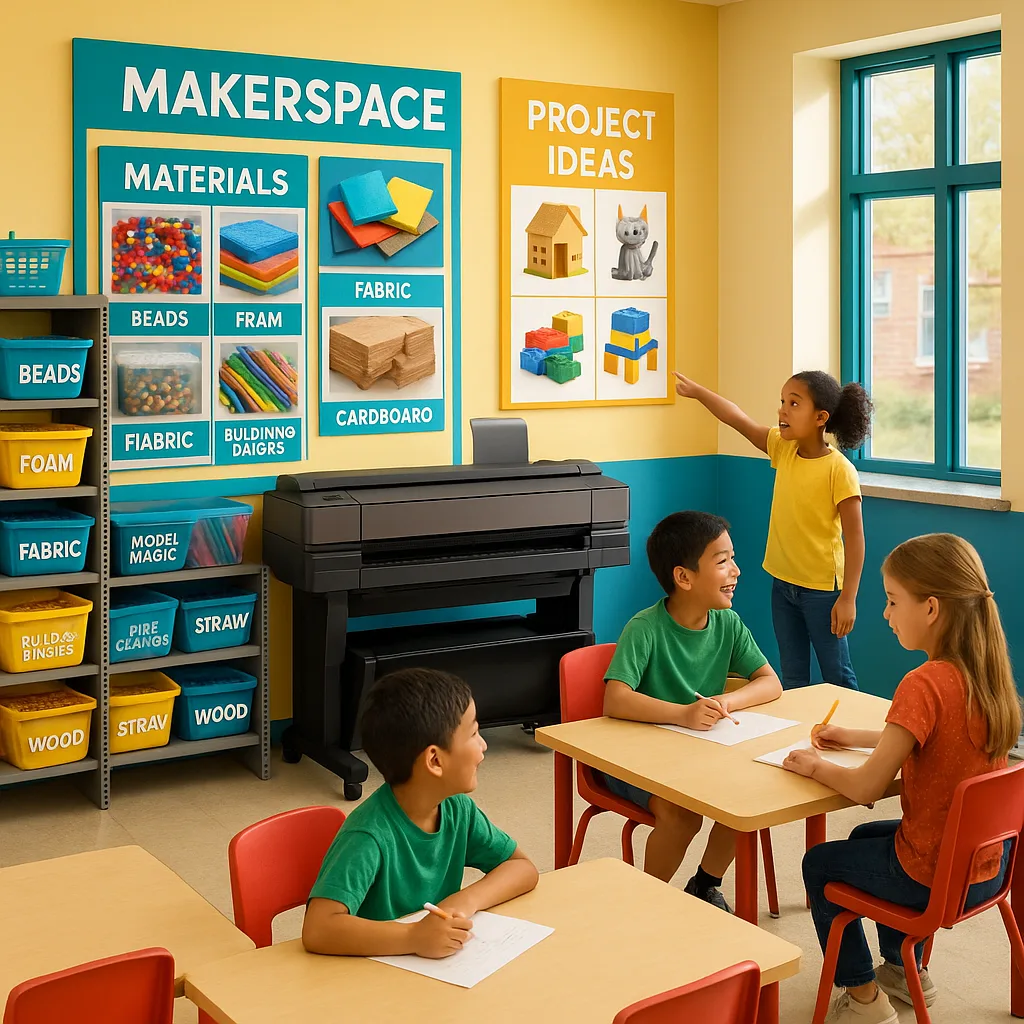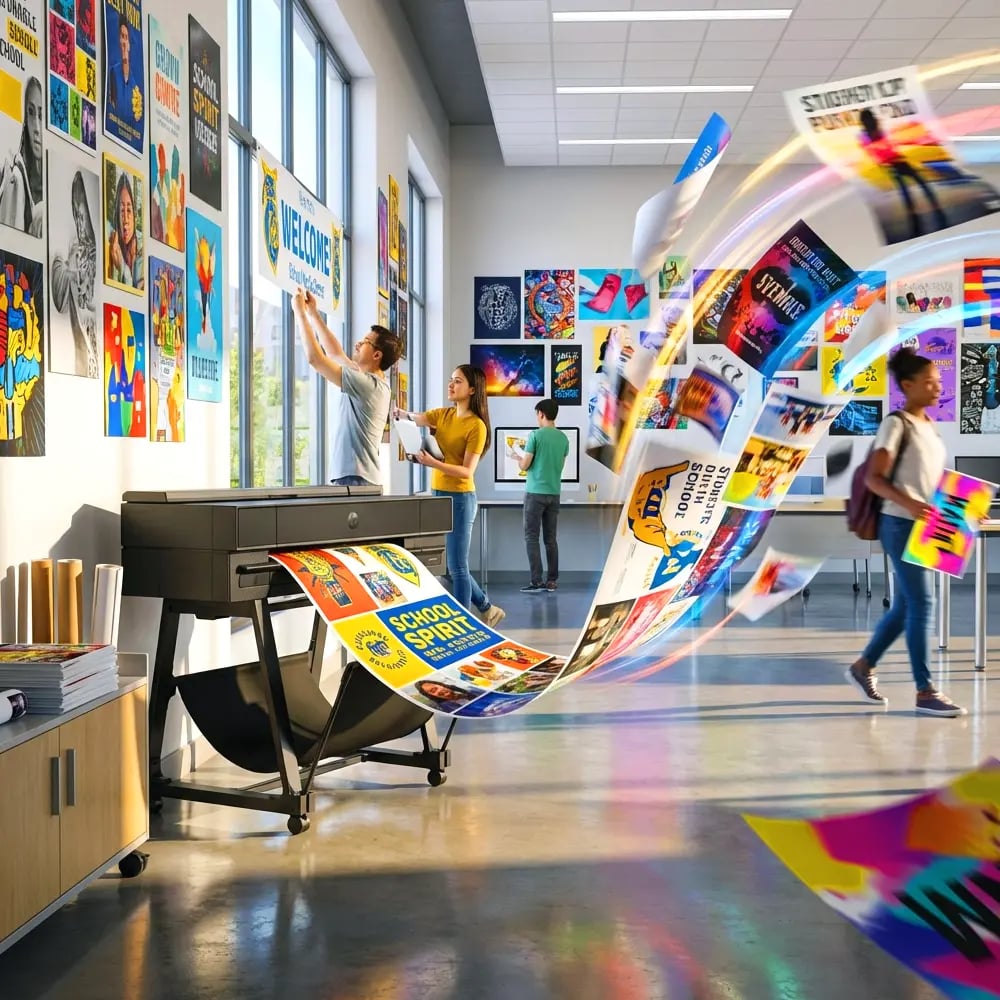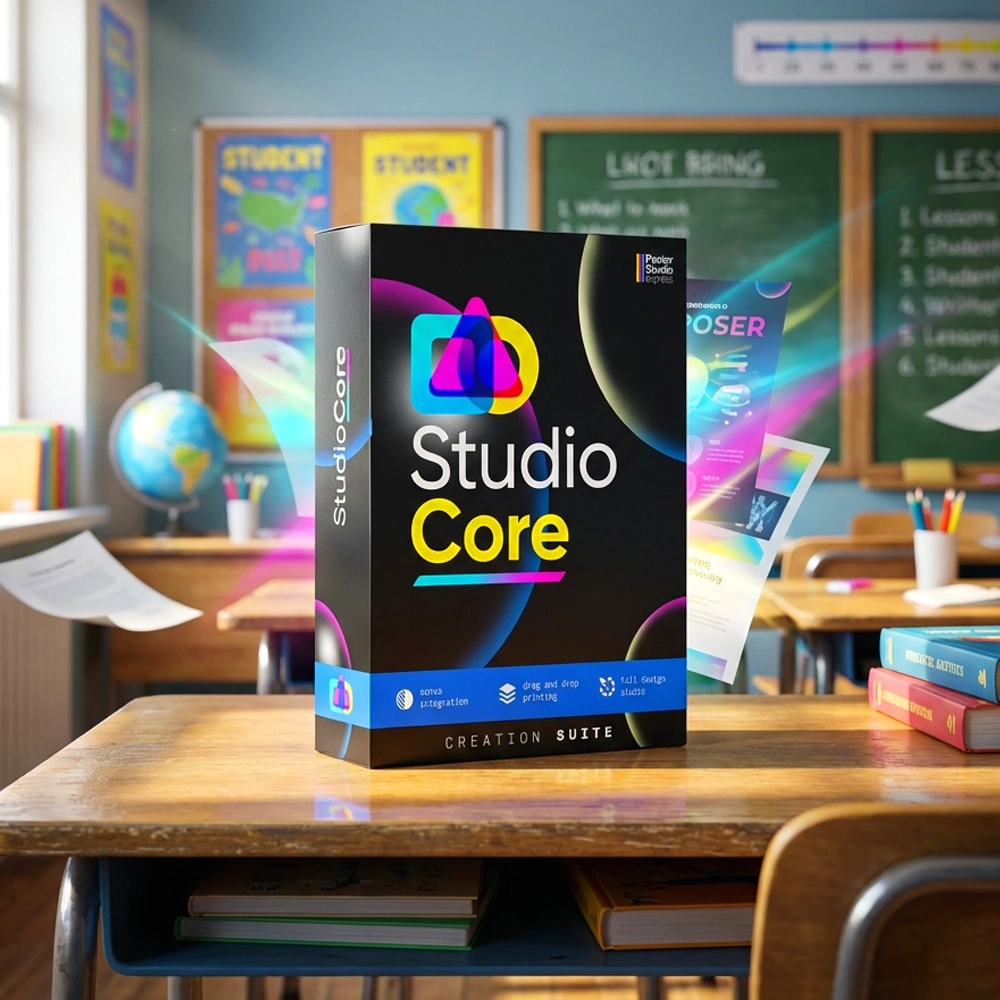
Last Tuesday, I watched a fourth-grader named Maya light up when she discovered our new visual inventory wall in the library makerspace. “Ms. Alvarez, I never knew we had conductive thread!” she exclaimed, pointing to the clearly labeled bin with its inspiring project photo. That moment captured exactly why I’m passionate about creating visual cataloging systems for makerspaces using our poster printer for schools makerspace setup.
Why Visual Organization Transforms Makerspaces
Research from the University of Texas shows that visual organization systems increase student engagement by 42% in hands-on learning environments. Moreover, when students can quickly identify and access materials, they spend 67% more time on creative exploration rather than searching for supplies. For makerspaces, this translates directly into more innovation and deeper learning experiences.
After implementing our visual inventory system last year, I noticed remarkable changes in how students interact with our makerspace. Previously, they would ask me constantly where to find materials. Now, they confidently navigate the space independently, discovering new supplies that inspire unexpected projects. Additionally, cleanup time decreased by 15 minutes because everyone knows exactly where materials belong.

Creating Your Poster Printer for Schools Makerspace System
Zone Mapping
Start by dividing your makerspace into logical zones. Therefore, I created five distinct areas: Electronics Corner, Crafting Station, Building Materials, Recycled Resources, and Tool Library. Each zone features a large poster displaying available materials with photos and project ideas.
Visual Labeling
Using our poster maker printer, I design labels that combine text, images, and color coding. Furthermore, each label includes a QR code linking to video tutorials or project ideas using that specific material.
Essential Components of Visual Inventory Systems
of students find materials faster with photo-based labels
report increased creativity with organized spaces
less time wasted searching for supplies
Labeling Strategies That Work
Effective labeling goes beyond simple text tags. Through trial and error, I’ve discovered that the most successful labels combine multiple elements to reach different types of learners. Here’s what works best in our makerspace:
- Photo-First Design: Large, clear photos of materials take center stage
- Color Coding: Match bin colors to poster backgrounds for instant recognition
- Bilingual Text: Include translations for ELL students
- Usage Icons: Simple symbols showing cutting, gluing, or electronic use
- Quantity Indicators: Visual cues for “take one” vs “share with class”
Recently, I partnered with our art teacher to create icon sets that students instantly understand. For instance, scissors symbols indicate cuttable materials, while lightning bolts mark electronic components. Subsequently, we printed these on waterproof vinyl using our school’s poster maker printer, ensuring they withstand daily use.
Quick Label Checklist
✓ High-contrast colors ✓ 72+ point font size ✓ Material photo included ✓ Safety symbols visible ✓ Project idea shown ✓ QR code for tutorials ✓ Laminated for durability ✓ Mounted at eye level
Project Inspiration Boards That Spark Innovation
Beyond organizing materials, inspiration boards serve as creative catalysts in our makerspace. Each month, I feature different themes aligned with curriculum standards or seasonal interests. Students often combine materials in unexpected ways after seeing project examples.
Last month’s “Circuits and Stories” board showcased LED greeting cards, paper circuit bookmarks, and conductive paint murals. Consequently, we saw a 300% increase in electronics project attempts. Students who typically avoided our Electronics Corner suddenly felt confident trying simple circuits.
Project Category Engagement After Visual Boards
Safety First: Visual Reminders That Stick
Safety posters in makerspaces need to be impossible to ignore yet not overwhelming. Research from the National Safety Council indicates that visual safety reminders reduce accidents by 45% in educational workshops. Here’s how I make safety messaging effective without creating fear:

Eye Protection
Always required in tool zones

Hot Tools
Adult supervision needed

Sharp Tools
Cut away from body

Clean Up
Everyone helps daily
Implementation Timeline & Budget Considerations
Creating a comprehensive visual inventory system doesn’t happen overnight. However, with strategic planning and the right tools, you can transform your makerspace incrementally. Here’s my tested timeline:
Week 1-2: Assessment
Inventory all materials and photograph everythingPlanning Phase
Map your space, identify zones, and gather student input about organization preferences. Create a master spreadsheet of all supplies.Week 3-4: Design
Create templates and design your first zoneCreation Phase
Use Canva or similar tools to design cohesive labels and posters. Print test versions to check readability and sizing.Week 5-6: Production
Print and laminate all materialsPrinting Phase
Utilize your poster printer for schools to create durable, professional signage. Include QR codes linking to digital resources.Week 7-8: Launch
Install system and train studentsTraining Phase
Host a makerspace orientation showcasing the new system. Create student helpers who can assist peers with navigation.Success Stories from the Field
School libraries across the nation are discovering how visual organization transforms their makerspaces. Here are inspiring examples:
“After implementing visual inventory boards, our material waste dropped by 60%. Students now take only what they need because they can see everything available.”
Sarah Chen Roosevelt Elementary, CA
“The poster printer for schools investment paid for itself in three months. We stopped ordering duplicate supplies because everyone could see our inventory.”
Marcus Johnson Prairie View Middle, TX
“Student creativity exploded when they could browse materials visually. Projects became more complex and thoughtful.”
Amy Rodriguez Hillside K-8, FL
Ready to Transform Your Makerspace?
Visual organization systems do more than tidy up your makerspace—they unlock student potential. When learners can see possibilities at a glance, creativity flourishes. Start small, think visually, and watch your makerspace become the creative hub your students deserve.
Questions about implementing visual systems in your makerspace? Call our education specialists at 866-788-7900 for personalized guidance.
Elena Alvarez is a National Board-certified Library Media Specialist passionate about transforming school libraries into vibrant learning hubs. Connect with her makerspace community at posterstudioexpress.com.






